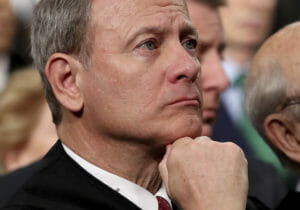Senate Rejects Scaled-Down Republican Effort to Repeal the Affordable Care Act
The "skinny repeal" bill would have repealed Obamacare's individual and employer coverage mandates and halted federal funds for Planned Parenthood for a year. The Senate voted down the "skinny repeal" health care bill on Friday. (Screen shot via YouTube)
The Senate voted down the "skinny repeal" health care bill on Friday. (Screen shot via YouTube)
The Senate voted down the “skinny repeal” health care bill on Friday. (Screen shot via YouTube)
On Friday morning, the Senate rejected the “skinny repeal” bill by a vote of 51-49. The bill would have altered the Affordable Care Act (ACA) in many ways, such as repealing individual and employer health insurance coverage mandates, delaying a medical device tax and stopping federal funds for Planned Parenthood for a year.
Sen. John McCain of Arizona joined two other Republicans, Susan Collins of Maine and Lisa Murkowski of Alaska, to put a final nail in the coffin of the Republican-led effort to repeal President Obama’s health care bill.
The New York Times reports:
Republican leaders, unable to overcome complaints from both moderate and conservative members of their caucus, said the skeletal plan was just a vehicle to permit negotiations with the House, which passed a much more ambitious repeal bill in early May.
The “skinny repeal” bill, as it became known at the Capitol this week, would still have had broad effects on health care. The bill would have increased the number of people who are uninsured by 15 million next year compared with current law, according to the nonpartisan Congressional Budget Office. Premiums for people buying insurance on their own would have increased roughly 20 percent, the budget office said.
… The new, eight-page Senate bill, called the Health Care Freedom Act, was unveiled just hours before the vote. It would have ended the requirement that most people have health coverage, known as the individual mandate. But it would not have put in place other incentives for people to obtain coverage—a situation that insurers say would leave them with a pool of sicker, costlier customers. It would also have ended the requirement that large employers offer coverage to their workers.
The “skinny repeal” would have delayed a tax on medical devices, cut off federal funds for Planned Parenthood for one year and increased federal grants to community health centers. It also would have increased the limit on contributions to tax-favored health savings accounts.
In addition, the bill would have made it much easier for states to waive federal requirements that health insurance plans provide consumers with a minimum set of benefits like maternity care and prescription drugs. It would have eliminated funds provided by the Affordable Care Act for a wide range of prevention and public health programs.
Deliberations occurred throughout Thursday night, and although only three Republicans voted against the bill, many disapproved of its content.
Sen. Lindsey Graham, R-S.C., called the bill a “disaster,” “terrible policy” and a “fraud” as a replacement for the ACA. Rep. Mark Walker, R-N.C., chairman of the conservative Republican Study Committee, said the bill was “ugly to the bone.”
House Speaker Paul Ryan gave assurances to Senate leaders that once the bill passed, Republicans in the two chambers would negotiate and reach further compromise. But according to the Times, Ryan “left open the possibility that if a compromise measure had failed in the Senate, the House could still pass the stripped-down Senate health bill. That helped push Mr. McCain to ‘no.’ “
President Trump called the House health care bill, which passed in May, “mean.” He told lawmakers in June that the bill did not do enough to protect individuals in the marketplace.
That House bill shared similarities with the bill the Senate considered on Friday. Nevertheless, Trump wanted the Senate bill to pass. He allegedly even directed Interior Secretary Ryan Zinke to call Murkowski and threaten Alaskan energy projects that are controlled by the Department of the Interior.
After Friday’s result came in, Trump responded:
3 Republicans and 48 Democrats let the American people down. As I said from the beginning, let ObamaCare implode, then deal. Watch!
— Donald J. Trump (@realDonaldTrump) July 28, 2017
Sen. Ted Cruz of Texas, who was a 2016 Republican presidential candidate, said, “For seven years, Republicans have campaigned on one central message that we would repeal the train wreck that is Obamacare. The losers tonight are the people who believed in the democratic process, believe that actually when candidates run and say, ‘I will fight to repeal Obamacare,’ that that actually means they will fight to repeal Obamacare.”
For now, Republicans plan to put a hold on the effort to repeal the Affordable Care Act. Members from both sides of the aisle, including Senate Democratic Minority Leader Chuck Schumer, point to the major issues that must be addressed.
Your support matters…Independent journalism is under threat and overshadowed by heavily funded mainstream media.
You can help level the playing field. Become a member.
Your tax-deductible contribution keeps us digging beneath the headlines to give you thought-provoking, investigative reporting and analysis that unearths what's really happening- without compromise.
Give today to support our courageous, independent journalists.






You need to be a supporter to comment.
There are currently no responses to this article.
Be the first to respond.